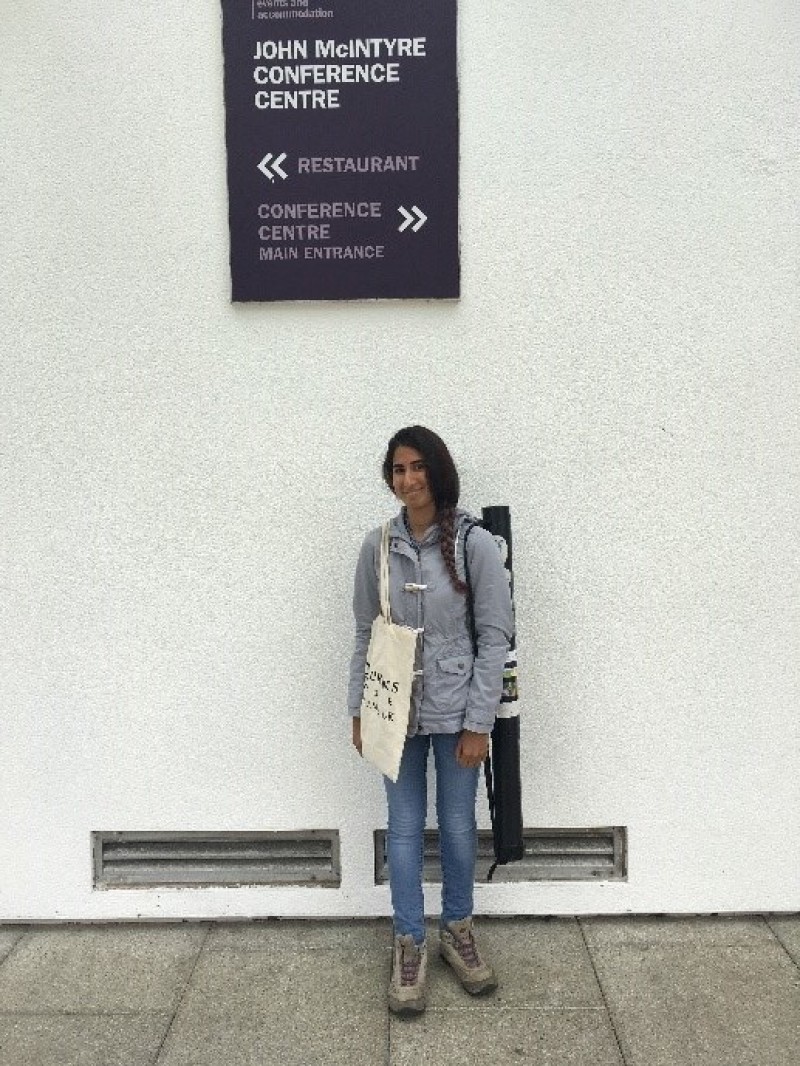Forams 2018: Edinburgh
Rehemat Bhatia
University College London

From June 18th-22nd, over 400 foraminifera enthusiasts from all over the world descended upon the city of Edinburgh, Scotland for the Forams 2018 conference. This conference is held once every four years, and pretty much covers anything to do with foraminifera, from genetics to geochemistry to the use of foraminifera in biomonitoring! I was quite excited to attend, as it was aptly timed with the end of my PhD (I successfully defended my PhD thesis with minor corrections just over a week before the start) so presented an opportunity to share my foram stories.
The conference icebreaker was held on June 17th, at the Playfair Library at Old College Hall, which provided a picturesque backdrop for everyone to mingle and catch up. I also helped to organise a ‘tweet-up’ with two early career researchers – Adriane Lam (PhD candidate at UMass, USA) and Jennifer Hertzberg (postdoc at Old Dominion University, USA). There are a large number of foram workers on Twitter, so we thought it would be fun to host a tweet-up for everyone to meet, and for those travelling alone to meet others. Many people came along to say hello, which was great!
Throughout the week, I attended talks both pertinent to my PhD and those that were slightly outside my research, as well as exploring the poster sessions throughout the day. At the conference, I presented two posters, one on Monday 18thentitled “Palaeoecology of Eocene planktonic foraminifera inferred from paired trace element and isotopic data” and a second on Tuesday 19thentitled “The mysterious palaeoecology of the genus Globigerinatheka”. Both were well received and I had some really useful discussions based on the data I presented, which will be useful for when I write up my PhD results into research papers. The feedback I received for the poster I presented on Monday was particularly useful for doing my thesis corrections, as I was able to talk with other ECRs and senior scientists who perform individual foraminifera analyses using highly spatially resolved analytical techniques. There was a good “work hard, play hard ethic” at the conference too, with a ceilidh on Tuesday evening and field trips to a variety of locations on Wednesday. The ceilidh was loads of fun (and definitely good exercise after sitting down listening to talks all day!) and the field trip to the Isle of May was puffin-tastic!
I thoroughly enjoyed attending Forams 2018, and it was the perfect ending to my PhD. I learnt lots of new science, was able to network with other scientists, and have returned to London with new motivation to do my thesis corrections and write up my data into papers. Forams 2018 is a micropalaeontological menagerie, and for students reading this I would encourage you to attend. I would like to thank the Challenger Society for allocating me a student travel grant and for making this experience possible – I had an awesome time!
Profile: Rehemat has just defended her PhD at University College London. Her PhD research focused on using the trace element and stable carbon and oxygen isotope signatures of Eocene and Miocene planktonic foraminifera to understand more about their ecologies, namely their depth habitats and relationships with photosymbionts.
Latest News
Royal Society Publishing Photography Competition 2025
Please see a message from the Royal Society below:
We are delighted to announce that the 2025 Competition is now open for entries until 15 August for a chance to win £1000! The competition celebrates the power of photography in conveying the wonder of science happening all around us and photographs can be submitted in the categories of: Astronomy, Behaviour, Earth Science and Climatology, Ecology and Environmental Science, and Microimaging.
The competition is free to enter and open to anyone studying or working in science at graduate level or above. Category winners will receive a one-year membership to the Royal Photographic Society and the overall winner will receive a grand prize of £1,000. Find out more: https://bit.ly/RSPphotocomp
October 2025 MEDIN Workshop: Marine Data Management, Governance and the MEDIN toolset
The Marine Environmental Data and Information Network (MEDIN) are pleased to announce that registration is now open for the next occurrence of our popular free online training workshop: ‘Marine Data Management, Governance and the MEDIN toolset’ on the 13th – 17th October 2025 on OceanTeacher Global Academy.
Marine Data Management, Governance and the MEDIN toolset
The Marine Environmental Data and Information Network (MEDIN) and OceanWise are delighted to invite you to attend our popular free online training workshop: ‘Marine Data Management, Governance and the MEDIN toolset’ on the 19th – 23rd of May 2025.
